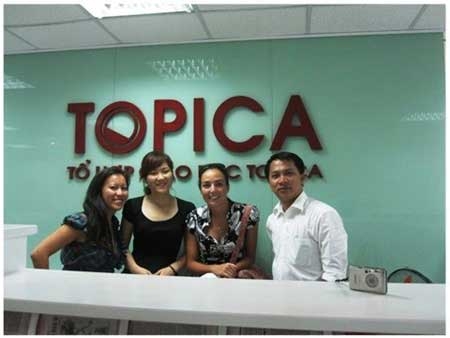
There have been 18 investment deals involving Vietnamese IT firms in the first nine months of 2013 amid the backdrop of the ongoing economic crisis, according to a survey carried out by Pham Minh Tuan, founder and CEO of TOPICA Education Group.
 Among the deals, the www.yton.vn health network project of the HSP Group received the most investment. The project was among 18 IT services to win Sao Khue 2013 Awards given by the Viet Nam Software and IT Services Association in April.
Among the deals, the www.yton.vn health network project of the HSP Group received the most investment. The project was among 18 IT services to win Sao Khue 2013 Awards given by the Viet Nam Software and IT Services Association in April.
"Any economic crisis can be considered as a storm. People who desire to set up a business choose to stay in a safe place to avoid the storm. They do not recklessly start to build something new that may be swept away."
This opinion was voiced by Nguyen Quang Duc, founder and CEO of HSP Group during a talk to youngsters interested in how to fund raise successfully during an economic crisis.
Sharing about that project, Duc said that joining start-up communities like he did would help young people realise the difficulties they may face and receive advice from successful entrepreneurs and experts in the field.
"Communities can bring opportunities, but chances must come with preparation and readiness," Duc said. "There are a lot of things start-up people have to face in the storm. They have to prepare and seek opportunities against a tornado."
He said that when investors knock the doors, start-up business people must be aware of their business model. They should choose strategic investors and not look for mentors, he added.
Attending the event as a guest speaker, Victor Lavrenko, CEO of Coc Coc search engine, pointed out the difference in persuading investors to join a project before and during the crisis.
"All investors are interested in making more profit and regard investment as a method. Before the crisis, it was fine if you lacked experience and were just smart. In a time of crisis, you need to be smart and show them your experience. They want to make sure that you can return them much more money than they invest," Victor said.
The CEO emphasised on building trust between investors and entrepreneurs. He took his company as an example.
The Coc Coc search engine, which is considered as a rival to Google in the Vietnamese market, gained support from Russian search engine Yandex, Internet service provider Mail.ru Group and international investment firm Digital Sky Technologies (an investor in Facebook).
Victor said that Yandex put their trust in Coc Coc because they were convinced by the company's foreign manager who had 15 years experience in IT field and developed two search engine products.
He said that during the crisis, investors would seek for professionals they trust.
"Before the crisis, you just needed to have a software or draft design, but now it is not enough. You have to show real existing projects with stable growth. During difficult times, investors seek fast results with cheap prices and entrepreneurs have to explain how it's going to be cheap enough," Victor said.
TOPICA founder Tuan gave a presentation on tech investment deals that took place from 2012 to June 2013. He said that investors were currently focusing investment in e-commerce, mobiles, educational technology and online payment systems.
"People funding start-ups should target global or regional markets rather than the domestic one. Some Vietnamese start-up companies, such as Money Lover and Appota, have already targeted foreign markets where there is more chance for growth," he said.
According to Tuan, Japanese and European investors are taking over and Singapore, which has invested a lot in Viet Nam, is falling behind after not making any start-up tech deals in the country.

 Previous page
Previous page Back to top
Back to top







